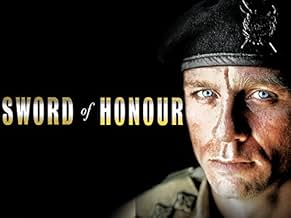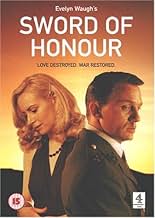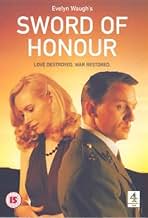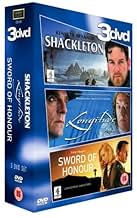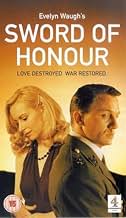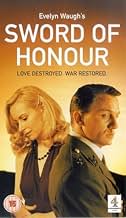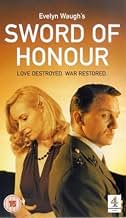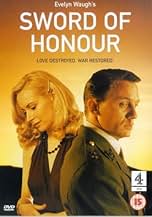Füge eine Handlung in deiner Sprache hinzuGuy Crouchback, heir to a declining English Roman Catholic family, returns to England from Italy at the start of World War II, and joins the Royal Corps of Halberdiers along with various ecc... Alles lesenGuy Crouchback, heir to a declining English Roman Catholic family, returns to England from Italy at the start of World War II, and joins the Royal Corps of Halberdiers along with various eccentrics, though his attempts to get back with his wife Virginia, from whom he is separated... Alles lesenGuy Crouchback, heir to a declining English Roman Catholic family, returns to England from Italy at the start of World War II, and joins the Royal Corps of Halberdiers along with various eccentrics, though his attempts to get back with his wife Virginia, from whom he is separated, fail. After being implicated in a colleague's death, he is sent to train a commando brig... Alles lesen
- Regie
- Drehbuch
- Hauptbesetzung
- Auszeichnungen
- 3 Gewinne & 1 Nominierung insgesamt
Empfohlene Bewertungen
What a letdown...
It's not that this mini-series is badly made, that Craig does not act well or that the dialogue is stilted. It is just soooooooo sloooooooooooow (except for some (too few) battle scenes) that it borders on boring. The one notable exception was the depiction of the battle for Crete, which looks as if was filmed on location. It had the flavour of the real thing, conveyed through the bright photography. Also, Robert Daws as brigade major Hound was fantastic.
To me (no prude) the love angle was over-emphasized, with Megan Dodds annoyingly bad. Altogether, it took up too much screen time at the expense of other, more important aspects like the War, character development or Guy's Catholic dilemmas.
Also, watching Richard Coyle acting in the same mode as he did in Coupling made me realize what a limited actor he is although again, I stress that in Coupling he was the heart of the show.
Some reviewers have already noted that this film does not compare well with the books it is based on. I will add that while most films indeed don't, this one was an extremely painful example of how not to make a TV series based on a book, especially a masterpiece.
I was positively surprised that the writers did not change much of Waugh's novels for dramatic condensation; they just omitted lots of peripheral characters and events of minor meaning to the overall plot.
The main characters are well cast and the acting is excellent. In contrast to some other reviewers, I am convinced that Daniel Craig is the perfect fit for his appearing neutral in the crucial point of class. Guy does not represent a specific class in the novels either: He's too catholic and too old for being a "chap" among the officers, he is too introverted and serious to succeed in society, and too rich and educated and considering to be a role model for the ordinary men. No, he remains an outsider to all worlds - which gives him the best position for observing and documenting all the others.
My better half liked the acting and thought the film gave her two good evenings of entertainment. Yet she was confused with the abrupt changes of locations and times (I had no problems with that with all the background knowledge of the novels and the dozens of Wikipedia pages I consulted to understand the novel's story while reading it).
I can understand her: If you are not really into WWII (and even more: if you are non-British), you really get lost if those sandy rocks now represent mock Crete in Scotland, Egypt or real Crete and what the heck were the British doing in Greece anyway? I don't think it was a good choice to split the story in two parts, while the book is made of three. The story lacks a stringent climactic structure anyway (life seldomly follows the rules scriptwriters have set for entertaining plots), and stopping in the midst of volume 2 does not really make things better. Maybe a 3 or 4 part miniseries with a run-time of 7 or 8 hours total would have been more fitting with the Crete and Yugoslavia episodes deserving a full leg of attention.
What I missed was the mentioning of Stalin. In the novel, two of Stalin's moves are main triggers for Guy's decisions: The Hitler-Stalin-pact of '39 convinces Guy to go back to England, join the army and fight the forces of evil. Germany's invasion of the USSR in '41 causes Stalin to change sides which makes Guy doubt his cause. The co-operation of the Allies with Stalin's Soviet Untion forms the quintessence of his conviction of the overall senselessness of his efforts. I can see that it is hard to make this fit into a movie version, but not to mention it at all? I also missed Stalin's sword mentioned although it is the name-giver to Waugh's trilogy.
What became clear to me after watching it is that the material is still well suited for movie or series adaptations. So, Netflix, Amazon - anyone?
Waugh has taken on the tough job of telling the truth from the inside and its not nice, good or even very inspiring. Unfortunately that's what we are like .Ultimately its these truths , not fantasy ,that sets us free .
The son ,father and growing men figures whose bouts of courage to do the right thing, give the play a gritty guts that make this drive through the sordid and mad mess of war really worthwhile . Because its so punchy, and even funny, if you a boy yourself , about stupid men, it should be shown in all public schools.
William Boyd's restructuring of Waugh's war trilogy is a miracle of adaptation - his leavening of verbal humour with slapstick; his capturing of Waugh's elliptical tone; his creation of haunting visual patterns acting as counterpoint to the horrific satire that is the war. There is one haunting sequence amid so much disintegration, the false bomb warning during Virginia's post-natal party, that magically hints at forces beyond man's self-defeating endeavour, while also rescuing a character Waugh was rather hard on. In the moral sense.
Wusstest du schon
- WissenswertesJulian Rhind-Tutt worked with Bond Actor Daniel Craig in The Trench and Sword of Honor.
- PatzerWhen Crouchback meets Iver in the hospital early in Segment 1, he notices Mrs. Stitche's large red hat on the hospital bed and sees them kissing. She later departs with Crouchback for a lunch party and is wearing a white hat with a red rose on it.
- VerbindungenVersion of Sword of Honour (1967)
Top-Auswahl
Details
- Erscheinungsdatum
- Herkunftsland
- Offizieller Standort
- Sprache
- Auch bekannt als
- Sword of Honor - Im Dienst der Krone
- Drehorte
- Produktionsfirma
- Weitere beteiligte Unternehmen bei IMDbPro anzeigen
Zu dieser Seite beitragen


